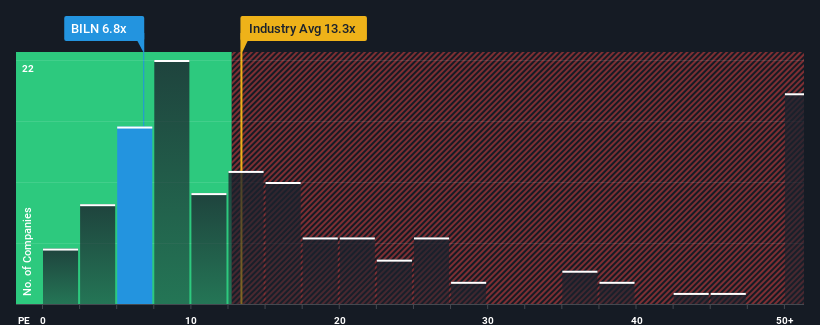- United Kingdom
- /
- Construction
- /
- AIM:BILN
Billington Holdings Plc (LON:BILN) Surges 26% Yet Its Low P/E Is No Reason For Excitement

Despite an already strong run, Billington Holdings Plc (LON:BILN) shares have been powering on, with a gain of 26% in the last thirty days. The last 30 days bring the annual gain to a very sharp 28%.
In spite of the firm bounce in price, Billington Holdings may still be sending very bullish signals at the moment with its price-to-earnings (or "P/E") ratio of 6.8x, since almost half of all companies in the United Kingdom have P/E ratios greater than 17x and even P/E's higher than 29x are not unusual. However, the P/E might be quite low for a reason and it requires further investigation to determine if it's justified.
With its earnings growth in positive territory compared to the declining earnings of most other companies, Billington Holdings has been doing quite well of late. One possibility is that the P/E is low because investors think the company's earnings are going to fall away like everyone else's soon. If you like the company, you'd be hoping this isn't the case so that you could potentially pick up some stock while it's out of favour.
See our latest analysis for Billington Holdings

What Are Growth Metrics Telling Us About The Low P/E?
Billington Holdings' P/E ratio would be typical for a company that's expected to deliver very poor growth or even falling earnings, and importantly, perform much worse than the market.
Retrospectively, the last year delivered an exceptional 116% gain to the company's bottom line. The strong recent performance means it was also able to grow EPS by 638% in total over the last three years. Accordingly, shareholders would have probably welcomed those medium-term rates of earnings growth.
Turning to the outlook, the next year should bring diminished returns, with earnings decreasing 38% as estimated by the one analyst watching the company. Meanwhile, the broader market is forecast to expand by 16%, which paints a poor picture.
With this information, we are not surprised that Billington Holdings is trading at a P/E lower than the market. However, shrinking earnings are unlikely to lead to a stable P/E over the longer term. There's potential for the P/E to fall to even lower levels if the company doesn't improve its profitability.
The Key Takeaway
Even after such a strong price move, Billington Holdings' P/E still trails the rest of the market significantly. It's argued the price-to-earnings ratio is an inferior measure of value within certain industries, but it can be a powerful business sentiment indicator.
As we suspected, our examination of Billington Holdings' analyst forecasts revealed that its outlook for shrinking earnings is contributing to its low P/E. At this stage investors feel the potential for an improvement in earnings isn't great enough to justify a higher P/E ratio. Unless these conditions improve, they will continue to form a barrier for the share price around these levels.
Having said that, be aware Billington Holdings is showing 3 warning signs in our investment analysis, and 1 of those is significant.
You might be able to find a better investment than Billington Holdings. If you want a selection of possible candidates, check out this free list of interesting companies that trade on a low P/E (but have proven they can grow earnings).
Valuation is complex, but we're here to simplify it.
Discover if Billington Holdings might be undervalued or overvalued with our detailed analysis, featuring fair value estimates, potential risks, dividends, insider trades, and its financial condition.
Access Free AnalysisHave feedback on this article? Concerned about the content? Get in touch with us directly. Alternatively, email editorial-team (at) simplywallst.com.
This article by Simply Wall St is general in nature. We provide commentary based on historical data and analyst forecasts only using an unbiased methodology and our articles are not intended to be financial advice. It does not constitute a recommendation to buy or sell any stock, and does not take account of your objectives, or your financial situation. We aim to bring you long-term focused analysis driven by fundamental data. Note that our analysis may not factor in the latest price-sensitive company announcements or qualitative material. Simply Wall St has no position in any stocks mentioned.
About AIM:BILN
Billington Holdings
Through its subsidiaries, designs, manufactures, and installs structural steelworks in the United Kingdom and Europe.
Flawless balance sheet with solid track record and pays a dividend.


